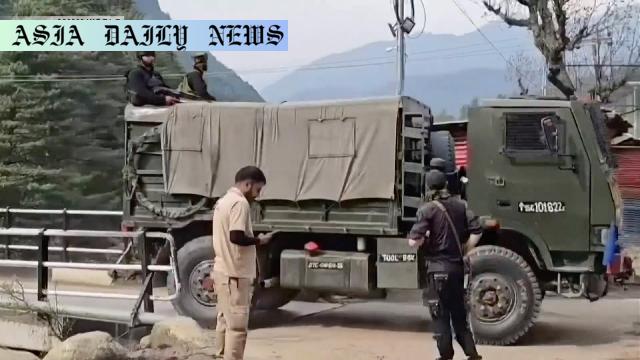Kashmir: US Secretary of State Marco Rubio will hold talks with Indian and Pakistani officials to address escalating tensions after last week’s attack.

Kashmir Attack: A Turning Point in Escalating Tensions
The region of Kashmir is no stranger to conflict, but the devastating attack on April 22 has sent shockwaves across international borders. On that day, gunmen targeted a group of tourists in the Indian-administered region of Jammu and Kashmir, killing 26 people. This attack not only cost innocent lives but also highlighted the persistent volatility brewing between the neighboring nations of India and Pakistan. The Kashmir region, claimed in its entirety by both nations but administratively divided, has long been a point of contention. Each incident in this hostile environment serves to further deteriorate an already fragile relationship between the two nuclear powers.
The response to the attack was swift and severe, with Indian Prime Minister Narendra Modi granting the nation’s military full operational autonomy to act against what has been described as terrorism. Conversely, Pakistan has expressed concerns about potential Indian aggression, stating they possess credible intelligence of a possible attack within the next 24 to 36 hours. The dual proclamations have alarmed the international community, escalating fears of military confrontations spiraling out of control.
US Intervention: Encouraging Diplomacy Amidst Tensions
Acknowledging the stakes, US Secretary of State Marco Rubio has stepped in to mediate between the two countries. According to State Department Spokesperson Tammy Bruce, Rubio is set to engage in talks with his counterparts in India and Pakistan as early as Tuesday or Wednesday. This move reflects the increasing concern from global powers about the repercussions of an unchecked dispute between India and Pakistan. The United States is encouraging all relevant international leaders to engage diplomatically and use their influence to promote peace between the nations.
This is not the first time these tensions have taken center stage on a global level. The situation is reminiscent of events in 2019 when India crossed the de-facto border, conducting an airstrike in response to a suicide attack in Kashmir. The possibility of another escalation is troubling, given the potential human and geopolitical consequences. As discussions proceed, there remains hope within the international community that diplomatic efforts will avert a larger crisis.
The Broader Implications of Conflict in Kashmir
Kashmir has often been referred to as the world’s most dangerous flashpoint. The mountainous region, blessed with breathtaking landscapes, has been marred by years of violence and war. The stakes in Kashmir are higher than ever with both India and Pakistan being nuclear powers. The latest developments underline how fragile the situation remains and the potential consequences of any provocation.
From a geopolitical standpoint, the involvement of global players like the United States demonstrates the urgent need for mediation. The volatile relationship between India and Pakistan has implications not just for South Asia but for international peace and security. Any significant conflict in the region threatens to disrupt global markets, destabilize the Asian continent, and heighten tensions among major stakeholders like China, Russia, and the United States.
Efforts to address the situation diplomatically underscore the importance of conflict resolution frameworks in volatile regions. As tensions mount, regional players and international organizations must rise to the challenge of fostering dialogue, enhancing conflict prevention mechanisms, and promoting long-term solutions for peace in Kashmir.
Commentary
The Need for Dialogue and Diplomacy
The situation in Kashmir is one of the most complex and emotionally charged conflicts in the modern world. It has endured for decades, creating an environment of mistrust and hostility between India and Pakistan. The latest developments—the attack killing 26 tourists, coupled with the subsequent retaliatory measures and threats—have pushed the region closer to confrontation. It is time for strong diplomatic measures to address the root causes and de-escalate current tensions.
One promising aspect of this crisis is the United States stepping in to foster dialogue. The involvement of a third party with a neutral stance could help bridge the deep divide between India and Pakistan. However, past experiences have shown that mediation efforts in the region need to go beyond mere dialogues; they require actionable frameworks that consider the historical, political, and emotional complexities surrounding Kashmir.
The Role of Global Powers in Facilitating Peace
Global powers like the US possess the tools and resources to influence regional peace, but their engagement must be impartial and deeply informed. Traditional responses, such as urging calm and facilitating one-off negotiations, often fail to address the recurring nature of the conflict. Instead, there needs to be a commitment to long-term stability in South Asia. The crisis in Kashmir calls for robust initiatives involving trade, development, and cultural exchanges to create a broader environment of cooperation.
Moreover, international organizations like the United Nations must also step up to engage both countries. Resolutions, diplomatic interventions, or even summits focused exclusively on Kashmir have the potential to prevent further escalation. If unaddressed, this latest standoff could set a dangerous precedent for international relations in the region.
Kashmir’s Cry for Peace
Kashmiris remain the silent sufferers in this prolonged conflict. The tragedies they face, including violence, displacement, and economic instability, rarely get the attention they deserve amid political posturing. Any mediation or solution must prioritize the voices of those directly affected. Ultimately, peace in Kashmir will rest upon collaborative efforts not only by governments but also by the region’s people, ensuring inclusivity in any peacebuilding process.
The world watches as Kashmir grapples with uncertainty. This is a decisive moment for leaders to step forward with courage, empathy, and a commitment to resolving one of the most intractable conflicts of modern history.


